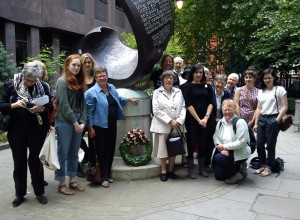A shorter version was published on Blogcritics.
The Honor Code: How Moral Revolutions Happen by Kwame Anthony Appiah asks some very interesting questions, and confronts a truly pressing problem. He asks, using the examples of dueling in Britain, footbinding of women in China, and the suppression of Atlantic slavery, how actions and activities that had been seen as acceptable, even honourable, can suddenly come to be seen as the opposite. He’s using these historic examples to try to see how so-called “honour” killings of women, particularly in Pakistan, which a UN report estimated in 2000 globally claimed 5,000 lives a year, might be made clearly and unambiguously dishonourable. His claim is that honour as a concept can be put to good causes, such as saving lives.
I’m not entirely convinced, but there certainly is some useful things to be learned from this book, particularly the fact that in all of the historic examples, it wasn’t some new fact, new knowledge or expanded understanding that led to the abolition of the practice. Argument on its own, no matter how obviously “right”, wasn’t going to win out.
In short Appiah suggests that in the case of dueling it was its slide down the social scale that helped to kill it, together, perversely, with the declining importance of the aristocratic class with which it was associated. Once linen merchants and bank managers starting dueling, it ceased to be honourable. Appiah quotes Guy Crouchback in Evelyn Waugh’s WWII novel Officers and Gentlemen. When asked what he’d do if challenged, the character replies “Laugh”.
On footbinding, Appiah says that the successful movement against it had its roots not only in Christian missionaries and the Western business elite, but also among the Chinese literati*, who saw it was necessary for China to modernise to compete in the world. On slavery, he says there was an important link with the struggle for respect by the working people (particularly then the working men) of Britain, who, while seeking political power had ” a new symbolic investment in their own dignity”, and since they did physical labour, its link with slavery diminished them: “For many of them, slavery rankled. Not simply because, as Britons, they cared about the nation’s honour, not just as a matter of Christian conscience, and not just because they were in competition with slaves (they were not). It rankled because they, like the slaves, labored and produced by the sweat of their brow.”
Appiah says that in fact there are two kinds of honour – esteem honour – which might be held by a top sportswoman or a government leader (well we can but hope). That reflects admiration for their achievements and abilities, and is competitive – you can raise your honour by doing better than honours. But a broader honour is recognition respect, which comes from simply accepting a person or group as a peer, deserving of rights and respect that you’d expect to be given yourself.
So this is his solution for Pakistan is first to enlist outsiders, primarily international feminist groups (which he says to a large extent already understand this), and more broadly women around the world, to see that the practice “treats women as less worthy of respect – less honourable – than men. They care about the issue as an issue of justice, no doubt. But they are also motivated to a significant degree by the symbolic meaning of honour killing as an expression of women’s subordination. It reflects a conviction that they are not entitled to a very basic kind of respect.” (p. 167) And then international disrespect, and opprobrium, needs to be applied to pressure Pakistan to change its view on what is honourable.
I’ve got doubts about the idea of “using” honour – it is something that seems so often to have been used against women, but I can see the argument about the importance of, and difficulty of getting recognition from men that women are their peers. We’re certainly finding that hard enough in Westminster.
*He provides an account of a fasinating woman “Mrs Little” – she’d earlier had a career as a novelist under her maiden name of Alicia Bewicke satirising “the empty social lives of the rich and the follies of the marriage market (p. 86), who was married to a businessman and who saw the danger of associating the movement with Christians, so touried the country seeking literati to support it – she succeeded in converting Li Hongzhang, governor-general of Guangzhou, to the cause.



 About
About